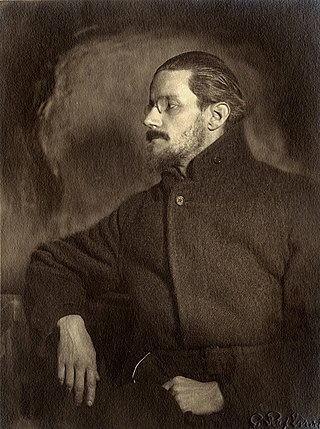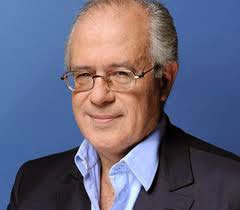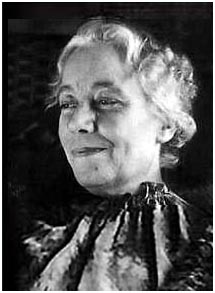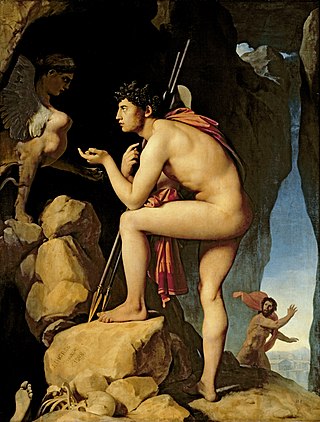Related Research Articles

Gerard Manley Hopkins was an English poet and Jesuit priest, whose posthumous fame places him among the leading English poets. His prosody – notably his concept of sprung rhythm – established him as an innovator, as did his praise of God through vivid use of imagery and nature.

James Augustine Aloysius Joyce was an Irish novelist, poet and literary critic. He contributed to the modernist avant-garde movement and is regarded as one of the most influential and important writers of the 20th century. Joyce's novel Ulysses (1922) is a landmark in which the episodes of Homer's Odyssey are paralleled in a variety of literary styles, particularly stream of consciousness. Other well-known works are the short-story collection Dubliners (1914), and the novels A Portrait of the Artist as a Young Man (1916) and Finnegans Wake (1939). His other writings include three books of poetry, a play, letters, and occasional journalism.
Psychoanalysis is a set of theories and therapeutic techniques that deal in part with the unconscious mind, and which together form a method of treatment for mental disorders. The discipline was established in the early 1890s by Sigmund Freud, whose work stemmed partly from the clinical work of Josef Breuer and others. Freud developed and refined the theory and practice of psychoanalysis until his death in 1939. In an encyclopedic article, he identified the cornerstones of psychoanalysis as "the assumption that there are unconscious mental processes, the recognition of the theory of repression and resistance, the appreciation of the importance of sexuality and of the Oedipus complex." Freud's colleagues Alfred Adler and Carl Gustav Jung developed offshoots of psychoanalysis which they called individual psychology (Adler) and analytical psychology (Jung), although Freud himself wrote a number of criticisms of them and emphatically denied that they were forms of psychoanalysis. Psychoanalysis was later developed in different directions by neo-Freudian thinkers, such as Erich Fromm, Karen Horney, and Harry Stack Sullivan.
Conversion therapy is the pseudoscientific practice of attempting to change an individual's sexual orientation, gender identity, or gender expression to align with heterosexual and cisgender norms. Methods that have been used to this end include forms of brain surgery, surgical or hormonal castration, aversive treatments such as electric shocks, nausea-inducing drugs, hypnosis, counseling, spiritual interventions, visualization, psychoanalysis, and arousal reconditioning.
Psychoanalytic literary criticism is literary criticism or literary theory that, in method, concept, or form, is influenced by the tradition of psychoanalysis begun by Sigmund Freud.
Alliteration is the repetition of syllable-initial consonant sounds between nearby words, or of syllable-initial vowels, if the syllables in question do not start with a consonant. It is often used as a literary device. A common example is "Peter Piper picked a peck of pickled peppers," in which the "p" sound is repeated.

Irish literature is literature written in the Irish, Latin, English and Scots languages on the island of Ireland. The earliest recorded Irish writing dates from back in the 7th century and was produced by monks writing in both Latin and Early Irish, including religious texts, poetry and mythological tales. There is a large surviving body of Irish mythological writing, including tales such as The Táin and Mad King Sweeny.
Thomas MacGreevy was a pivotal figure in the history of Irish literary modernism. A poet, he was also director of the National Gallery of Ireland from 1950 to 1963 and served on the first Irish Arts Council.

Geoffrey Anketell Studdert Kennedy was an English Anglican priest and poet. He was nicknamed "Woodbine Willie" during World War I for giving Woodbine cigarettes to the soldiers he met, as well as spiritual aid to injured and dying soldiers.
Castration anxiety is an overwhelming fear of damage to, or loss of, the penis—a derivative of Sigmund Freud's theory of the castration complex, one of his earliest psychoanalytic theories. The term refers to the fear of emasculation in both a literal and metaphorical sense.

Thomas Kinsella was an Irish poet, translator, editor, and publisher. Born outside Dublin, Kinsella attended University College Dublin before entering the civil service. He began publishing poetry in the early 1950s and, around the same time, translated early Irish poetry into English. In the 1960s, he moved to the United States to teach English at universities including Temple University. Kinsella continued to publish steadily until the 2010s.
Events in the year 1904 in Ireland.

Jacques-Alain Miller is a psychoanalyst and writer. He is one of the founding members of the École de la Cause freudienne and the World Association of Psychoanalysis which he presided from 1992 to 2002. He is the sole editor of the books of The Seminars of Jacques Lacan.

Enniskerry is a village in County Wicklow, Ireland. The population was 2,008 at the 2022 census.

The Furrow is an Irish Catholic theological periodical published monthly by Maynooth College.
Gerald Dawe was an Irish poet, academic and literary critic.
David Wheatley is an Irish poet and critic. He was born in Dublin and studied at Trinity College, Dublin, where he edited Icarus. Wheatley is the author of four volumes of poetry with Gallery Press, as well as several chapbooks. He has also edited the work of James Clarence Mangan, and features in the Bloodaxe anthology The New Irish Poets, and the Wake Forest Irish Poetry Series Vol. 1.

Karen Horney was a German psychoanalyst who practiced in the United States during her later career. Her theories questioned some traditional Freudian views. This was particularly true of her theories of sexuality and of the instinct orientation of psychoanalysis. She is credited with founding feminist psychology in response to Freud's theory of penis envy. She disagreed with Freud about inherent differences in the psychology of men and women, and like Adler, she traced such differences to society and culture rather than biology.

In classical psychoanalytic theory, the Oedipus complex refers to a son's sexual attitude towards his mother and concomitant hostility toward his father, first formed during the phallic stage of psychosexual development. A daughter's attitude of desire for her father and hostility toward her mother is referred to as the feminine Oedipus complex. The general concept was considered by Sigmund Freud in The Interpretation of Dreams (1899), although the term itself was introduced in his paper A Special Type of Choice of Object made by Men (1910).

Cathal Ó Searcaigh, is a modern Irish language poet. His work has been widely translated, anthologised and studied. "His confident internationalism", according to Theo Dorgan, has channeled "new modes, new possibilities, into the writing of Irish language poetry in our time".
References
- ↑ Bernard Kennedy on Marquis Who's Who
- 1 2 3 "Bernard Kennedy". Poem Hunter. Retrieved 2023-01-06.
- ↑ "Bernard Kennedy". www.poetrykit.org. Retrieved 2023-01-06.
- ↑ Kennedy, Bernard (April 2013). "Ireland's Crashing Catholicism". The Furrow . 64 (4): 236–241. JSTOR 24635608.
- ↑ "PARISH ADMINISTRATION". Immaculate Heart of Mary Parish. Retrieved 2023-01-06.
- ↑ "Kennedy, Bernard" . Retrieved 2023-01-06.
- ↑ "ABBEYDORNEY PARISH ~ ST - Diocese of Kerry".
- ↑ "Bernard Kennedy Archives". The Letter. Retrieved 2023-01-06.
- ↑ Kennedy, Bernard (Spring 2005). "St. Teresa, Mysticism and That's Not It – The Agalma of Homosexual and Hetrosexual Desire". The Letter. 33: 98–104.
- ↑ Kennedy, Bernard (Autumn 2005). "Joyce, The Castration Complex, and the Nom Du Pere". The Letter. 35: 50–58.
- ↑ "Bernard Kennedy - The Freudian Understanding of the Symptom". The Letter. 2015-04-24. Retrieved 2023-01-06.
- ↑ "Bernard Kennedy". www.amazon.co.uk. Retrieved 2023-01-06.
- ↑ "Quotes by Bernard Kennedy". authors.citatepedia.com. Retrieved 2023-01-06.
- ↑ Bernard Kennedy in libraries ( WorldCat catalog)
- ↑ "Bernard Kennedy Poems - Biography of Poet Bernard Kennedy". OZoFe.Com. Retrieved 2023-01-06.
- ↑ "Bernard Kennedy" . Retrieved 2023-01-06.
- ↑ "James Liddy, In the Slovac Bowling Alley James Liddy, Art is not for Grownups Eithne Strong, Let Liv". Poetry Ireland . Retrieved 2024-07-29.
- ↑ Velker, Arthur; Quinn, Trevor (22 May 2018). "Prayers said for tragic Jastine Valdez and family of killer Mark Hennessy at emotional vigil service in Enniskerry, Co Wicklow". Irish Mirror . Retrieved 3 January 2023.
- ↑ "Hundreds turnout in Enniskerry for Jastine vigil". Wicklow News. 23 May 2018. Retrieved 3 January 2023.
- ↑ McDermott, Stephen (21 May 2018). "Locals in Enniskerry shocked and saddened after body found in search for Jastine Valdez". Dublin Live . Retrieved 3 January 2023.
- ↑ "Bernard Kennedy Pp". The Irish Times . Retrieved 3 January 2023.
- ↑ Kennedy, Bernard (Spring 2006). "The Priesthood and Homosexuality: A Basis to Dialogue". The Furrow . 95 (377): 77–87. JSTOR 30095796.
- ↑ Kennedy, Bernard (September 2002). "Out of Our Depth? A Reflection on Paedophilia". The Furrow . 53 (9): 479–483. JSTOR 27664594.
- ↑ GAFCON gathering claims 'sense of betrayal' at liberal Anglican teaching
- ↑ "German Remembrance Day 2022". The Glencree Centre for Peace and Reconciliation. Retrieved 2023-01-06.
- ↑ McGreevy, Ronan (11 March 2009). "Mourners turn out for Anna Manahan". The Irish Times . Retrieved 4 January 2023.
- ↑ Kane, Conor (12 March 2009). "Anna makes final grand exit". Irish Independent. Retrieved 4 January 2023.